International Accounting: Evaluating Harmonisation and IFRS Adoption in Japan with Toyota Case Study
VerifiedAdded on 2023/06/09
|16
|4293
|488
AI Summary
This article evaluates the success of harmonisation in international accounting and the adoption of IFRS regulations in Japan. It discusses the advantages and limitations of IFRS implementation, Japan's adoption of IFRS, and a case study of Toyota Motor Corporation's successful adoption of IFRS. The article also highlights the challenges faced by organisations while adopting IFRS. Subject: Accounting, Course Code: N/A, Course Name: N/A, College/University: N/A
Contribute Materials
Your contribution can guide someone’s learning journey. Share your
documents today.
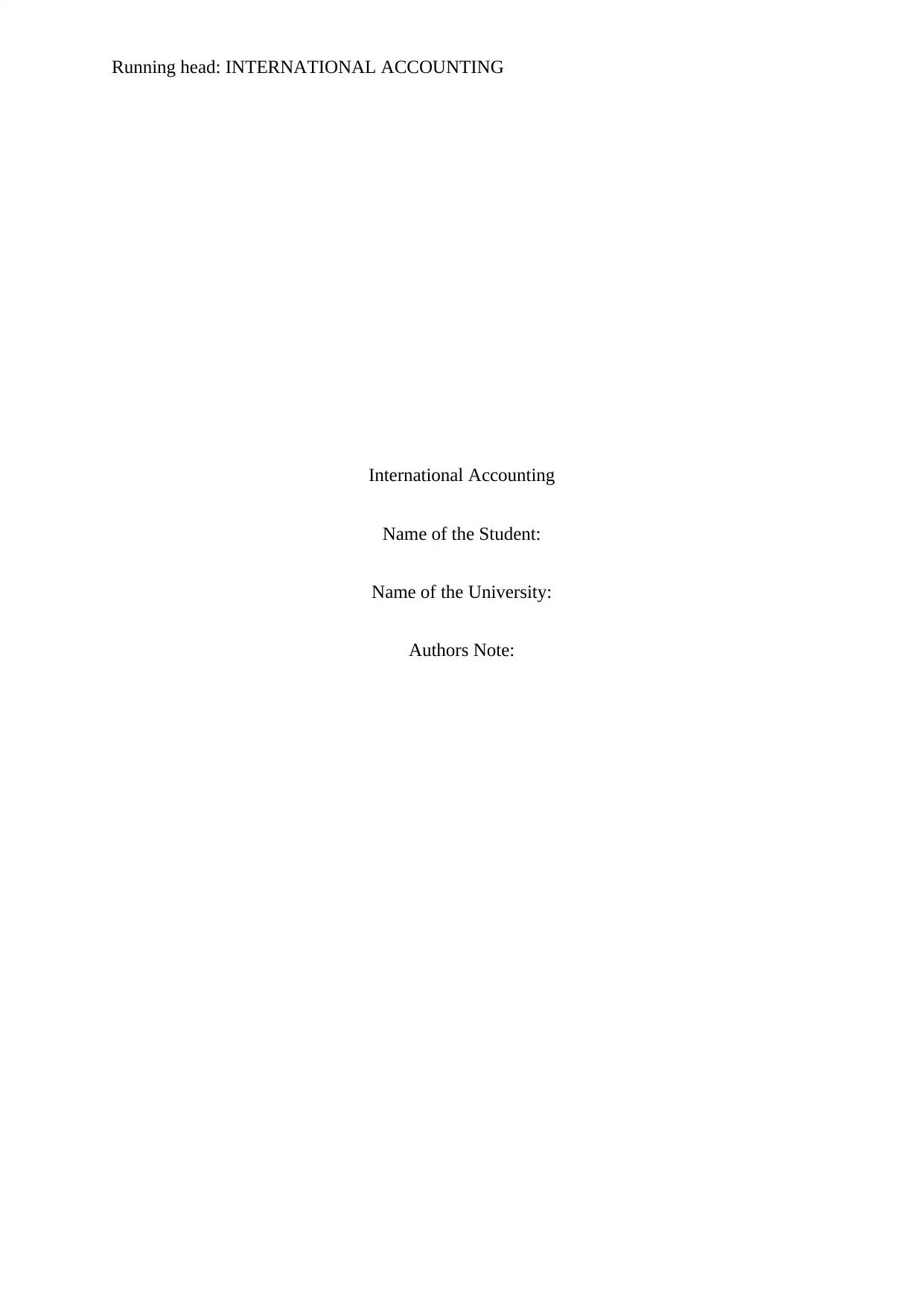
Running head: INTERNATIONAL ACCOUNTING
International Accounting
Name of the Student:
Name of the University:
Authors Note:
International Accounting
Name of the Student:
Name of the University:
Authors Note:
Secure Best Marks with AI Grader
Need help grading? Try our AI Grader for instant feedback on your assignments.
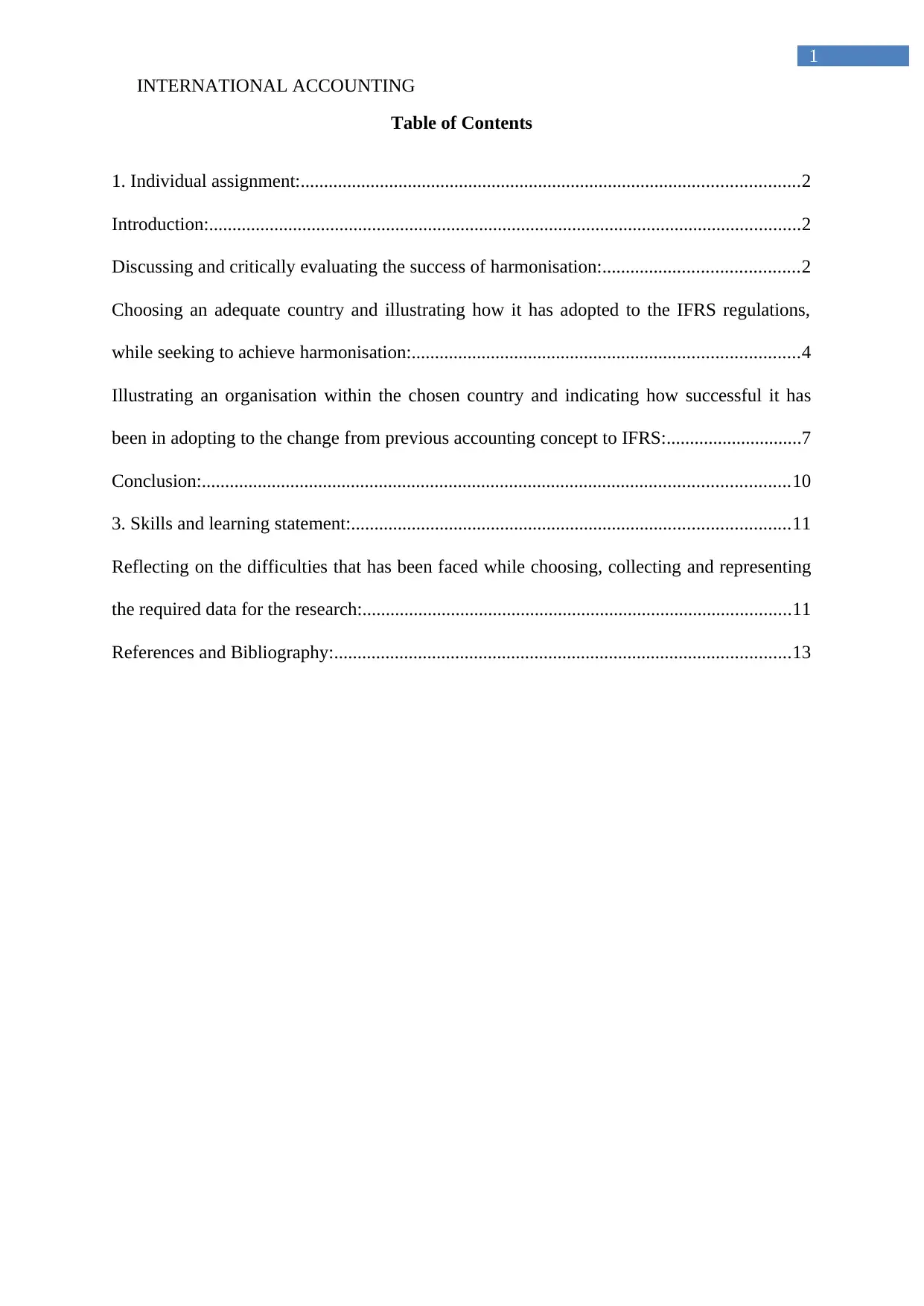
INTERNATIONAL ACCOUNTING
1
Table of Contents
1. Individual assignment:...........................................................................................................2
Introduction:...............................................................................................................................2
Discussing and critically evaluating the success of harmonisation:..........................................2
Choosing an adequate country and illustrating how it has adopted to the IFRS regulations,
while seeking to achieve harmonisation:...................................................................................4
Illustrating an organisation within the chosen country and indicating how successful it has
been in adopting to the change from previous accounting concept to IFRS:.............................7
Conclusion:..............................................................................................................................10
3. Skills and learning statement:..............................................................................................11
Reflecting on the difficulties that has been faced while choosing, collecting and representing
the required data for the research:............................................................................................11
References and Bibliography:..................................................................................................13
1
Table of Contents
1. Individual assignment:...........................................................................................................2
Introduction:...............................................................................................................................2
Discussing and critically evaluating the success of harmonisation:..........................................2
Choosing an adequate country and illustrating how it has adopted to the IFRS regulations,
while seeking to achieve harmonisation:...................................................................................4
Illustrating an organisation within the chosen country and indicating how successful it has
been in adopting to the change from previous accounting concept to IFRS:.............................7
Conclusion:..............................................................................................................................10
3. Skills and learning statement:..............................................................................................11
Reflecting on the difficulties that has been faced while choosing, collecting and representing
the required data for the research:............................................................................................11
References and Bibliography:..................................................................................................13
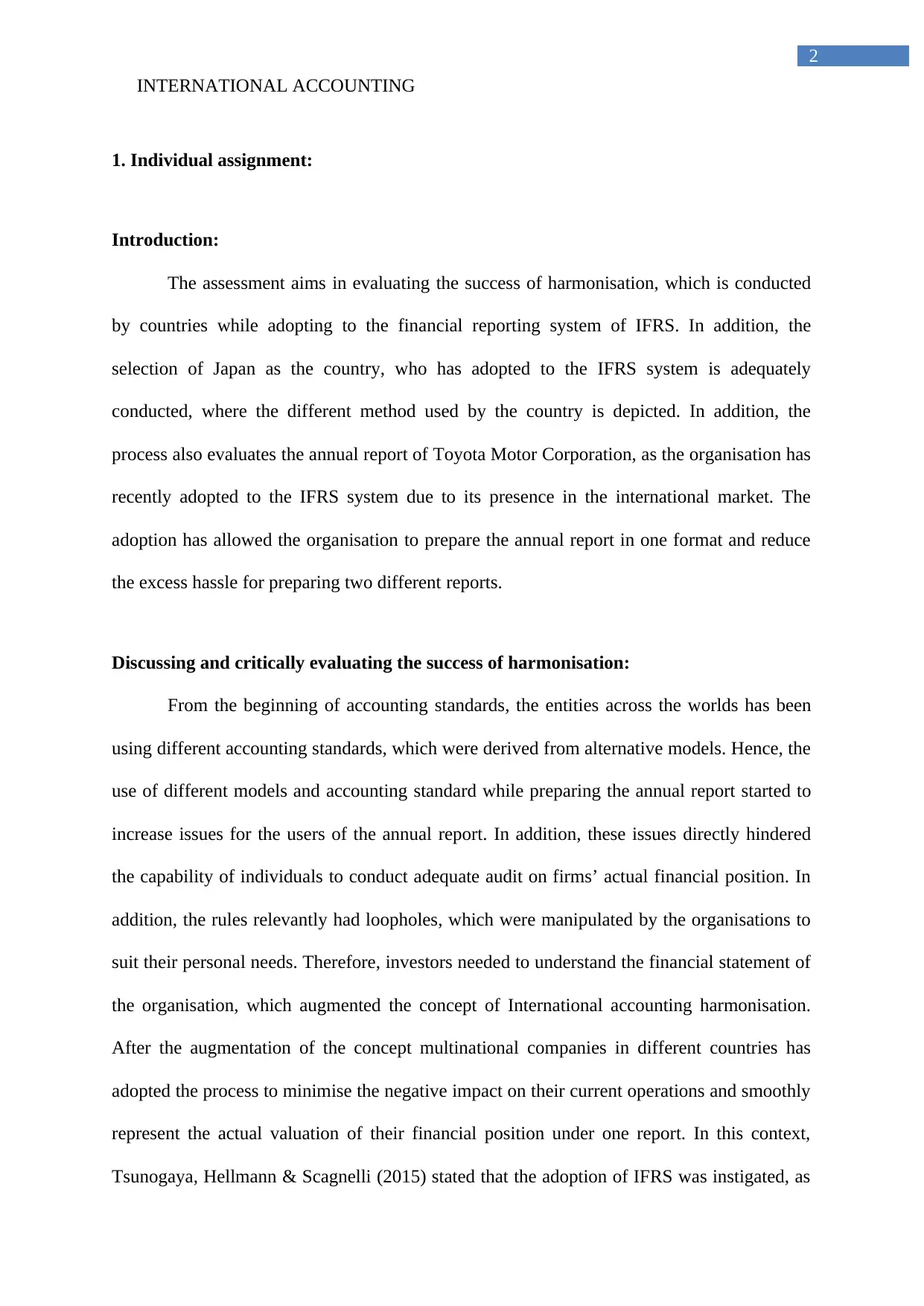
INTERNATIONAL ACCOUNTING
2
1. Individual assignment:
Introduction:
The assessment aims in evaluating the success of harmonisation, which is conducted
by countries while adopting to the financial reporting system of IFRS. In addition, the
selection of Japan as the country, who has adopted to the IFRS system is adequately
conducted, where the different method used by the country is depicted. In addition, the
process also evaluates the annual report of Toyota Motor Corporation, as the organisation has
recently adopted to the IFRS system due to its presence in the international market. The
adoption has allowed the organisation to prepare the annual report in one format and reduce
the excess hassle for preparing two different reports.
Discussing and critically evaluating the success of harmonisation:
From the beginning of accounting standards, the entities across the worlds has been
using different accounting standards, which were derived from alternative models. Hence, the
use of different models and accounting standard while preparing the annual report started to
increase issues for the users of the annual report. In addition, these issues directly hindered
the capability of individuals to conduct adequate audit on firms’ actual financial position. In
addition, the rules relevantly had loopholes, which were manipulated by the organisations to
suit their personal needs. Therefore, investors needed to understand the financial statement of
the organisation, which augmented the concept of International accounting harmonisation.
After the augmentation of the concept multinational companies in different countries has
adopted the process to minimise the negative impact on their current operations and smoothly
represent the actual valuation of their financial position under one report. In this context,
Tsunogaya, Hellmann & Scagnelli (2015) stated that the adoption of IFRS was instigated, as
2
1. Individual assignment:
Introduction:
The assessment aims in evaluating the success of harmonisation, which is conducted
by countries while adopting to the financial reporting system of IFRS. In addition, the
selection of Japan as the country, who has adopted to the IFRS system is adequately
conducted, where the different method used by the country is depicted. In addition, the
process also evaluates the annual report of Toyota Motor Corporation, as the organisation has
recently adopted to the IFRS system due to its presence in the international market. The
adoption has allowed the organisation to prepare the annual report in one format and reduce
the excess hassle for preparing two different reports.
Discussing and critically evaluating the success of harmonisation:
From the beginning of accounting standards, the entities across the worlds has been
using different accounting standards, which were derived from alternative models. Hence, the
use of different models and accounting standard while preparing the annual report started to
increase issues for the users of the annual report. In addition, these issues directly hindered
the capability of individuals to conduct adequate audit on firms’ actual financial position. In
addition, the rules relevantly had loopholes, which were manipulated by the organisations to
suit their personal needs. Therefore, investors needed to understand the financial statement of
the organisation, which augmented the concept of International accounting harmonisation.
After the augmentation of the concept multinational companies in different countries has
adopted the process to minimise the negative impact on their current operations and smoothly
represent the actual valuation of their financial position under one report. In this context,
Tsunogaya, Hellmann & Scagnelli (2015) stated that the adoption of IFRS was instigated, as
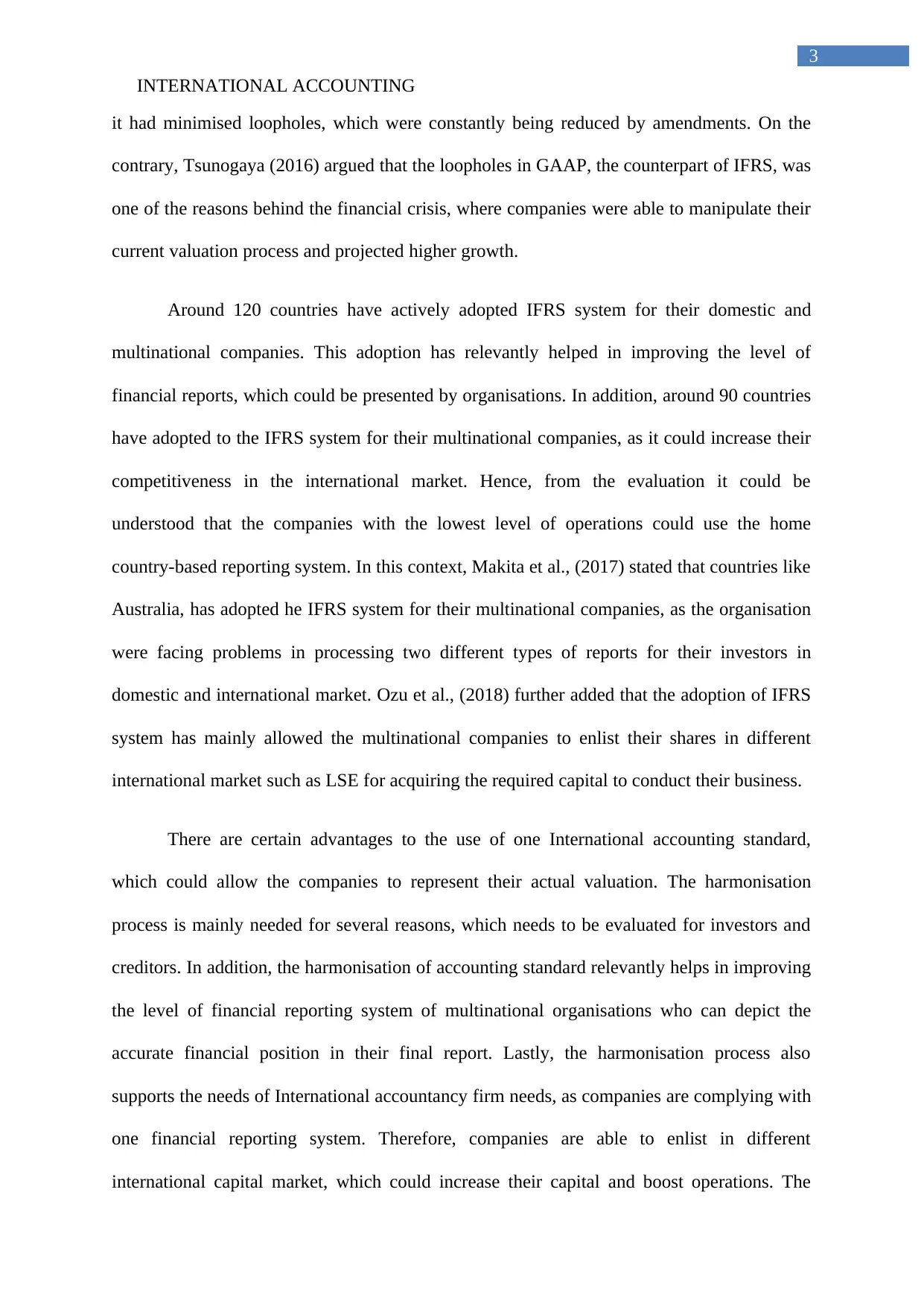
INTERNATIONAL ACCOUNTING
3
it had minimised loopholes, which were constantly being reduced by amendments. On the
contrary, Tsunogaya (2016) argued that the loopholes in GAAP, the counterpart of IFRS, was
one of the reasons behind the financial crisis, where companies were able to manipulate their
current valuation process and projected higher growth.
Around 120 countries have actively adopted IFRS system for their domestic and
multinational companies. This adoption has relevantly helped in improving the level of
financial reports, which could be presented by organisations. In addition, around 90 countries
have adopted to the IFRS system for their multinational companies, as it could increase their
competitiveness in the international market. Hence, from the evaluation it could be
understood that the companies with the lowest level of operations could use the home
country-based reporting system. In this context, Makita et al., (2017) stated that countries like
Australia, has adopted he IFRS system for their multinational companies, as the organisation
were facing problems in processing two different types of reports for their investors in
domestic and international market. Ozu et al., (2018) further added that the adoption of IFRS
system has mainly allowed the multinational companies to enlist their shares in different
international market such as LSE for acquiring the required capital to conduct their business.
There are certain advantages to the use of one International accounting standard,
which could allow the companies to represent their actual valuation. The harmonisation
process is mainly needed for several reasons, which needs to be evaluated for investors and
creditors. In addition, the harmonisation of accounting standard relevantly helps in improving
the level of financial reporting system of multinational organisations who can depict the
accurate financial position in their final report. Lastly, the harmonisation process also
supports the needs of International accountancy firm needs, as companies are complying with
one financial reporting system. Therefore, companies are able to enlist in different
international capital market, which could increase their capital and boost operations. The
3
it had minimised loopholes, which were constantly being reduced by amendments. On the
contrary, Tsunogaya (2016) argued that the loopholes in GAAP, the counterpart of IFRS, was
one of the reasons behind the financial crisis, where companies were able to manipulate their
current valuation process and projected higher growth.
Around 120 countries have actively adopted IFRS system for their domestic and
multinational companies. This adoption has relevantly helped in improving the level of
financial reports, which could be presented by organisations. In addition, around 90 countries
have adopted to the IFRS system for their multinational companies, as it could increase their
competitiveness in the international market. Hence, from the evaluation it could be
understood that the companies with the lowest level of operations could use the home
country-based reporting system. In this context, Makita et al., (2017) stated that countries like
Australia, has adopted he IFRS system for their multinational companies, as the organisation
were facing problems in processing two different types of reports for their investors in
domestic and international market. Ozu et al., (2018) further added that the adoption of IFRS
system has mainly allowed the multinational companies to enlist their shares in different
international market such as LSE for acquiring the required capital to conduct their business.
There are certain advantages to the use of one International accounting standard,
which could allow the companies to represent their actual valuation. The harmonisation
process is mainly needed for several reasons, which needs to be evaluated for investors and
creditors. In addition, the harmonisation of accounting standard relevantly helps in improving
the level of financial reporting system of multinational organisations who can depict the
accurate financial position in their final report. Lastly, the harmonisation process also
supports the needs of International accountancy firm needs, as companies are complying with
one financial reporting system. Therefore, companies are able to enlist in different
international capital market, which could increase their capital and boost operations. The
Secure Best Marks with AI Grader
Need help grading? Try our AI Grader for instant feedback on your assignments.
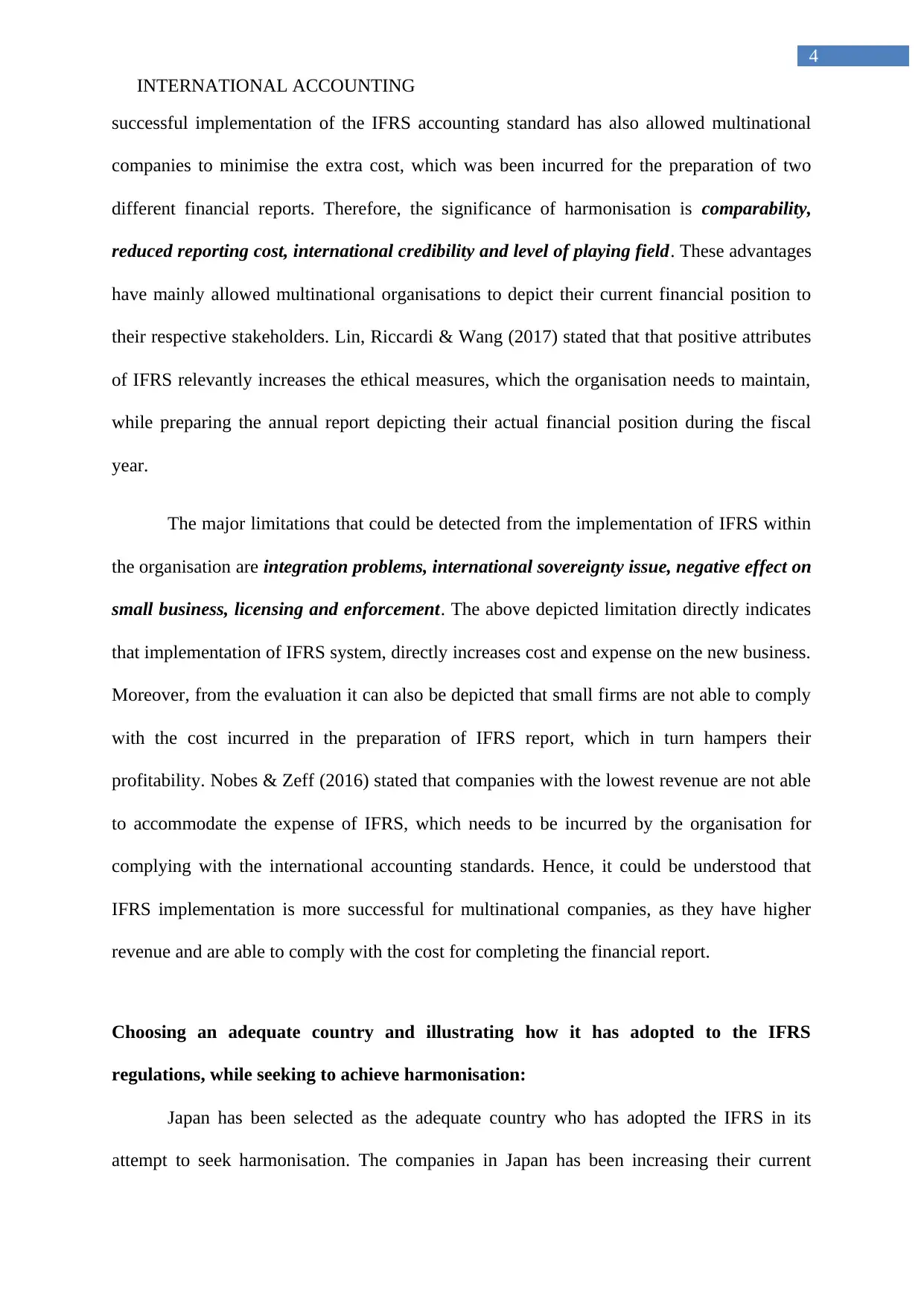
INTERNATIONAL ACCOUNTING
4
successful implementation of the IFRS accounting standard has also allowed multinational
companies to minimise the extra cost, which was been incurred for the preparation of two
different financial reports. Therefore, the significance of harmonisation is comparability,
reduced reporting cost, international credibility and level of playing field. These advantages
have mainly allowed multinational organisations to depict their current financial position to
their respective stakeholders. Lin, Riccardi & Wang (2017) stated that that positive attributes
of IFRS relevantly increases the ethical measures, which the organisation needs to maintain,
while preparing the annual report depicting their actual financial position during the fiscal
year.
The major limitations that could be detected from the implementation of IFRS within
the organisation are integration problems, international sovereignty issue, negative effect on
small business, licensing and enforcement. The above depicted limitation directly indicates
that implementation of IFRS system, directly increases cost and expense on the new business.
Moreover, from the evaluation it can also be depicted that small firms are not able to comply
with the cost incurred in the preparation of IFRS report, which in turn hampers their
profitability. Nobes & Zeff (2016) stated that companies with the lowest revenue are not able
to accommodate the expense of IFRS, which needs to be incurred by the organisation for
complying with the international accounting standards. Hence, it could be understood that
IFRS implementation is more successful for multinational companies, as they have higher
revenue and are able to comply with the cost for completing the financial report.
Choosing an adequate country and illustrating how it has adopted to the IFRS
regulations, while seeking to achieve harmonisation:
Japan has been selected as the adequate country who has adopted the IFRS in its
attempt to seek harmonisation. The companies in Japan has been increasing their current
4
successful implementation of the IFRS accounting standard has also allowed multinational
companies to minimise the extra cost, which was been incurred for the preparation of two
different financial reports. Therefore, the significance of harmonisation is comparability,
reduced reporting cost, international credibility and level of playing field. These advantages
have mainly allowed multinational organisations to depict their current financial position to
their respective stakeholders. Lin, Riccardi & Wang (2017) stated that that positive attributes
of IFRS relevantly increases the ethical measures, which the organisation needs to maintain,
while preparing the annual report depicting their actual financial position during the fiscal
year.
The major limitations that could be detected from the implementation of IFRS within
the organisation are integration problems, international sovereignty issue, negative effect on
small business, licensing and enforcement. The above depicted limitation directly indicates
that implementation of IFRS system, directly increases cost and expense on the new business.
Moreover, from the evaluation it can also be depicted that small firms are not able to comply
with the cost incurred in the preparation of IFRS report, which in turn hampers their
profitability. Nobes & Zeff (2016) stated that companies with the lowest revenue are not able
to accommodate the expense of IFRS, which needs to be incurred by the organisation for
complying with the international accounting standards. Hence, it could be understood that
IFRS implementation is more successful for multinational companies, as they have higher
revenue and are able to comply with the cost for completing the financial report.
Choosing an adequate country and illustrating how it has adopted to the IFRS
regulations, while seeking to achieve harmonisation:
Japan has been selected as the adequate country who has adopted the IFRS in its
attempt to seek harmonisation. The companies in Japan has been increasing their current
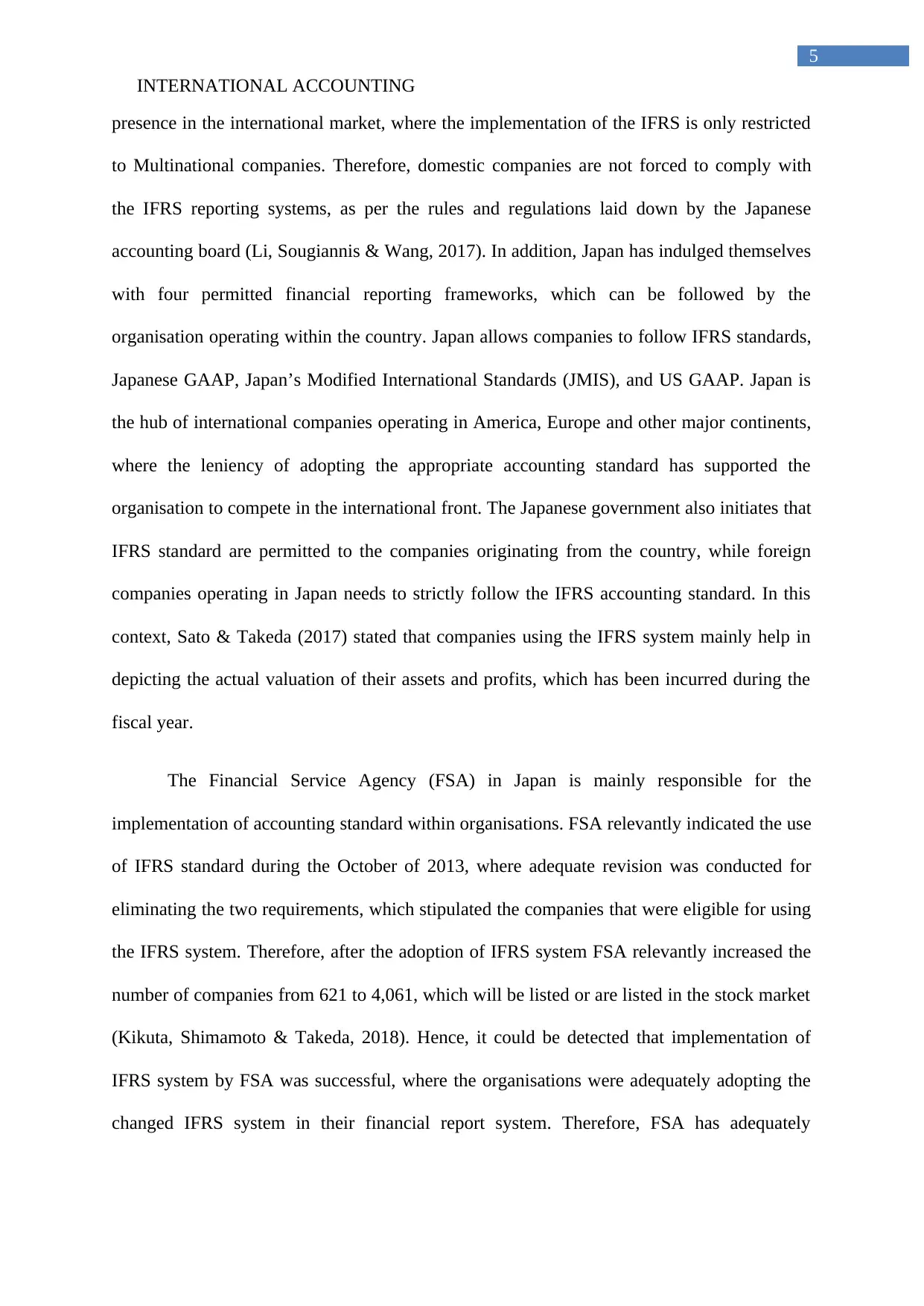
INTERNATIONAL ACCOUNTING
5
presence in the international market, where the implementation of the IFRS is only restricted
to Multinational companies. Therefore, domestic companies are not forced to comply with
the IFRS reporting systems, as per the rules and regulations laid down by the Japanese
accounting board (Li, Sougiannis & Wang, 2017). In addition, Japan has indulged themselves
with four permitted financial reporting frameworks, which can be followed by the
organisation operating within the country. Japan allows companies to follow IFRS standards,
Japanese GAAP, Japan’s Modified International Standards (JMIS), and US GAAP. Japan is
the hub of international companies operating in America, Europe and other major continents,
where the leniency of adopting the appropriate accounting standard has supported the
organisation to compete in the international front. The Japanese government also initiates that
IFRS standard are permitted to the companies originating from the country, while foreign
companies operating in Japan needs to strictly follow the IFRS accounting standard. In this
context, Sato & Takeda (2017) stated that companies using the IFRS system mainly help in
depicting the actual valuation of their assets and profits, which has been incurred during the
fiscal year.
The Financial Service Agency (FSA) in Japan is mainly responsible for the
implementation of accounting standard within organisations. FSA relevantly indicated the use
of IFRS standard during the October of 2013, where adequate revision was conducted for
eliminating the two requirements, which stipulated the companies that were eligible for using
the IFRS system. Therefore, after the adoption of IFRS system FSA relevantly increased the
number of companies from 621 to 4,061, which will be listed or are listed in the stock market
(Kikuta, Shimamoto & Takeda, 2018). Hence, it could be detected that implementation of
IFRS system by FSA was successful, where the organisations were adequately adopting the
changed IFRS system in their financial report system. Therefore, FSA has adequately
5
presence in the international market, where the implementation of the IFRS is only restricted
to Multinational companies. Therefore, domestic companies are not forced to comply with
the IFRS reporting systems, as per the rules and regulations laid down by the Japanese
accounting board (Li, Sougiannis & Wang, 2017). In addition, Japan has indulged themselves
with four permitted financial reporting frameworks, which can be followed by the
organisation operating within the country. Japan allows companies to follow IFRS standards,
Japanese GAAP, Japan’s Modified International Standards (JMIS), and US GAAP. Japan is
the hub of international companies operating in America, Europe and other major continents,
where the leniency of adopting the appropriate accounting standard has supported the
organisation to compete in the international front. The Japanese government also initiates that
IFRS standard are permitted to the companies originating from the country, while foreign
companies operating in Japan needs to strictly follow the IFRS accounting standard. In this
context, Sato & Takeda (2017) stated that companies using the IFRS system mainly help in
depicting the actual valuation of their assets and profits, which has been incurred during the
fiscal year.
The Financial Service Agency (FSA) in Japan is mainly responsible for the
implementation of accounting standard within organisations. FSA relevantly indicated the use
of IFRS standard during the October of 2013, where adequate revision was conducted for
eliminating the two requirements, which stipulated the companies that were eligible for using
the IFRS system. Therefore, after the adoption of IFRS system FSA relevantly increased the
number of companies from 621 to 4,061, which will be listed or are listed in the stock market
(Kikuta, Shimamoto & Takeda, 2018). Hence, it could be detected that implementation of
IFRS system by FSA was successful, where the organisations were adequately adopting the
changed IFRS system in their financial report system. Therefore, FSA has adequately
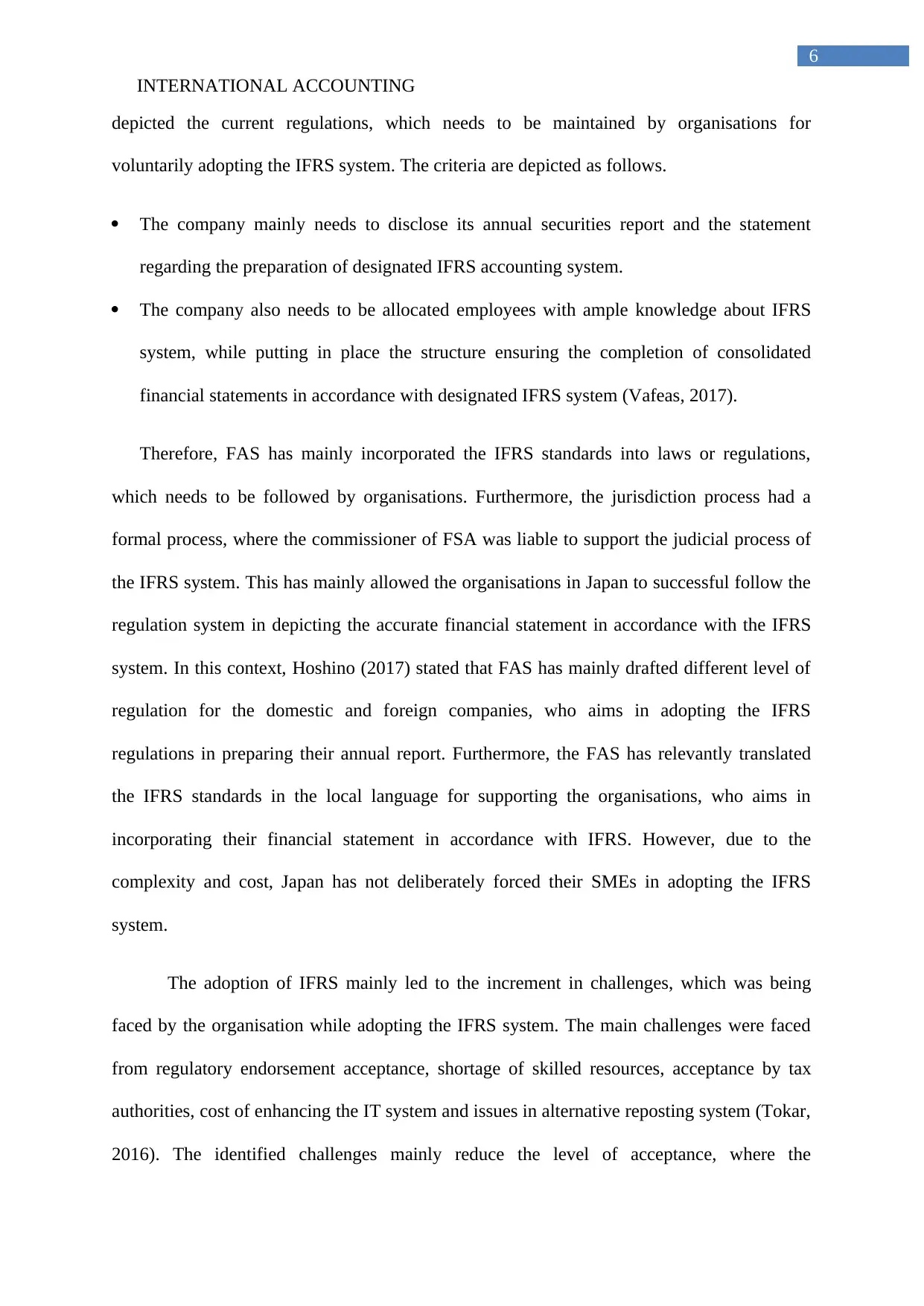
INTERNATIONAL ACCOUNTING
6
depicted the current regulations, which needs to be maintained by organisations for
voluntarily adopting the IFRS system. The criteria are depicted as follows.
The company mainly needs to disclose its annual securities report and the statement
regarding the preparation of designated IFRS accounting system.
The company also needs to be allocated employees with ample knowledge about IFRS
system, while putting in place the structure ensuring the completion of consolidated
financial statements in accordance with designated IFRS system (Vafeas, 2017).
Therefore, FAS has mainly incorporated the IFRS standards into laws or regulations,
which needs to be followed by organisations. Furthermore, the jurisdiction process had a
formal process, where the commissioner of FSA was liable to support the judicial process of
the IFRS system. This has mainly allowed the organisations in Japan to successful follow the
regulation system in depicting the accurate financial statement in accordance with the IFRS
system. In this context, Hoshino (2017) stated that FAS has mainly drafted different level of
regulation for the domestic and foreign companies, who aims in adopting the IFRS
regulations in preparing their annual report. Furthermore, the FAS has relevantly translated
the IFRS standards in the local language for supporting the organisations, who aims in
incorporating their financial statement in accordance with IFRS. However, due to the
complexity and cost, Japan has not deliberately forced their SMEs in adopting the IFRS
system.
The adoption of IFRS mainly led to the increment in challenges, which was being
faced by the organisation while adopting the IFRS system. The main challenges were faced
from regulatory endorsement acceptance, shortage of skilled resources, acceptance by tax
authorities, cost of enhancing the IT system and issues in alternative reposting system (Tokar,
2016). The identified challenges mainly reduce the level of acceptance, where the
6
depicted the current regulations, which needs to be maintained by organisations for
voluntarily adopting the IFRS system. The criteria are depicted as follows.
The company mainly needs to disclose its annual securities report and the statement
regarding the preparation of designated IFRS accounting system.
The company also needs to be allocated employees with ample knowledge about IFRS
system, while putting in place the structure ensuring the completion of consolidated
financial statements in accordance with designated IFRS system (Vafeas, 2017).
Therefore, FAS has mainly incorporated the IFRS standards into laws or regulations,
which needs to be followed by organisations. Furthermore, the jurisdiction process had a
formal process, where the commissioner of FSA was liable to support the judicial process of
the IFRS system. This has mainly allowed the organisations in Japan to successful follow the
regulation system in depicting the accurate financial statement in accordance with the IFRS
system. In this context, Hoshino (2017) stated that FAS has mainly drafted different level of
regulation for the domestic and foreign companies, who aims in adopting the IFRS
regulations in preparing their annual report. Furthermore, the FAS has relevantly translated
the IFRS standards in the local language for supporting the organisations, who aims in
incorporating their financial statement in accordance with IFRS. However, due to the
complexity and cost, Japan has not deliberately forced their SMEs in adopting the IFRS
system.
The adoption of IFRS mainly led to the increment in challenges, which was being
faced by the organisation while adopting the IFRS system. The main challenges were faced
from regulatory endorsement acceptance, shortage of skilled resources, acceptance by tax
authorities, cost of enhancing the IT system and issues in alternative reposting system (Tokar,
2016). The identified challenges mainly reduce the level of acceptance, where the
Paraphrase This Document
Need a fresh take? Get an instant paraphrase of this document with our AI Paraphraser
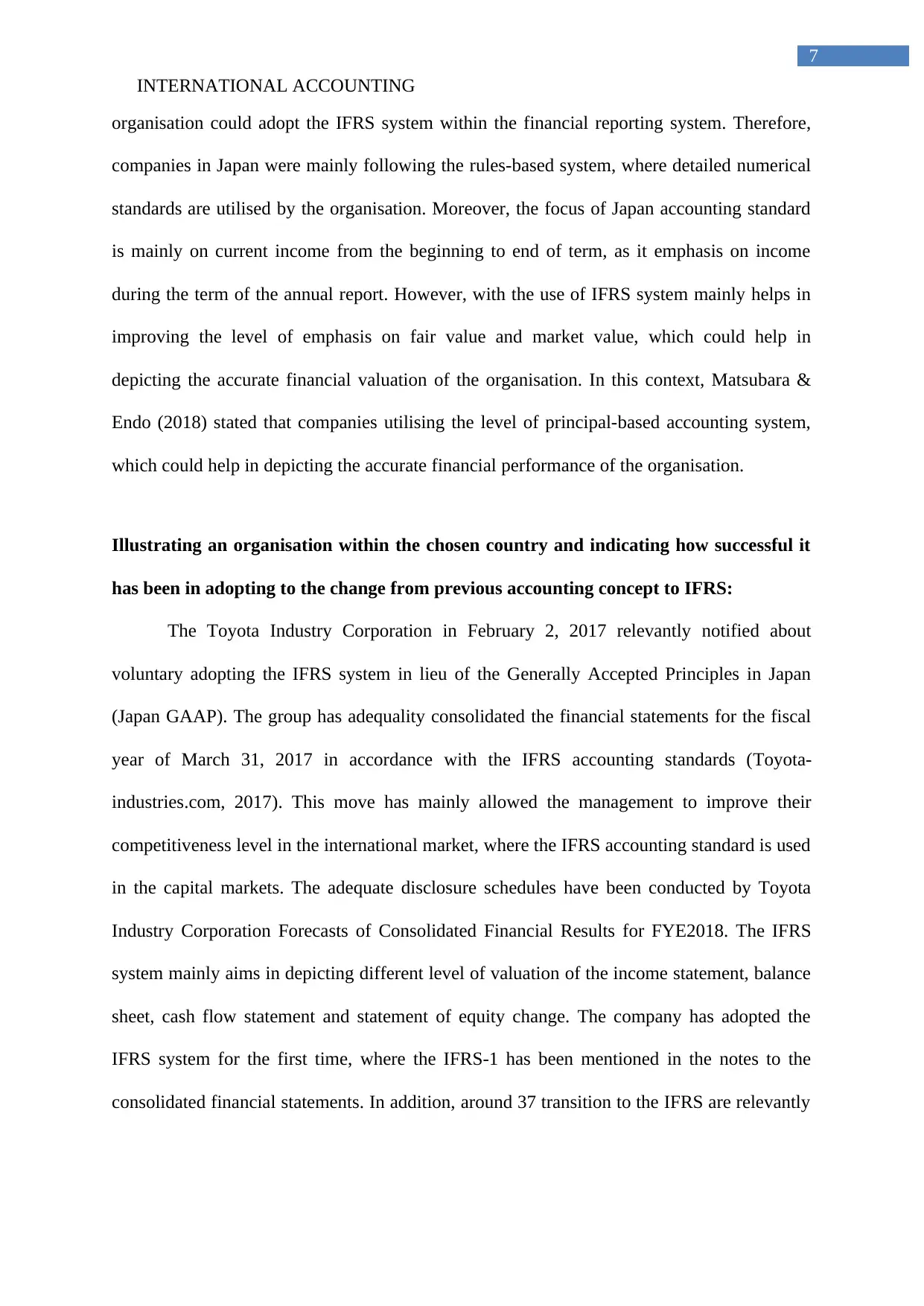
INTERNATIONAL ACCOUNTING
7
organisation could adopt the IFRS system within the financial reporting system. Therefore,
companies in Japan were mainly following the rules-based system, where detailed numerical
standards are utilised by the organisation. Moreover, the focus of Japan accounting standard
is mainly on current income from the beginning to end of term, as it emphasis on income
during the term of the annual report. However, with the use of IFRS system mainly helps in
improving the level of emphasis on fair value and market value, which could help in
depicting the accurate financial valuation of the organisation. In this context, Matsubara &
Endo (2018) stated that companies utilising the level of principal-based accounting system,
which could help in depicting the accurate financial performance of the organisation.
Illustrating an organisation within the chosen country and indicating how successful it
has been in adopting to the change from previous accounting concept to IFRS:
The Toyota Industry Corporation in February 2, 2017 relevantly notified about
voluntary adopting the IFRS system in lieu of the Generally Accepted Principles in Japan
(Japan GAAP). The group has adequality consolidated the financial statements for the fiscal
year of March 31, 2017 in accordance with the IFRS accounting standards (Toyota-
industries.com, 2017). This move has mainly allowed the management to improve their
competitiveness level in the international market, where the IFRS accounting standard is used
in the capital markets. The adequate disclosure schedules have been conducted by Toyota
Industry Corporation Forecasts of Consolidated Financial Results for FYE2018. The IFRS
system mainly aims in depicting different level of valuation of the income statement, balance
sheet, cash flow statement and statement of equity change. The company has adopted the
IFRS system for the first time, where the IFRS-1 has been mentioned in the notes to the
consolidated financial statements. In addition, around 37 transition to the IFRS are relevantly
7
organisation could adopt the IFRS system within the financial reporting system. Therefore,
companies in Japan were mainly following the rules-based system, where detailed numerical
standards are utilised by the organisation. Moreover, the focus of Japan accounting standard
is mainly on current income from the beginning to end of term, as it emphasis on income
during the term of the annual report. However, with the use of IFRS system mainly helps in
improving the level of emphasis on fair value and market value, which could help in
depicting the accurate financial valuation of the organisation. In this context, Matsubara &
Endo (2018) stated that companies utilising the level of principal-based accounting system,
which could help in depicting the accurate financial performance of the organisation.
Illustrating an organisation within the chosen country and indicating how successful it
has been in adopting to the change from previous accounting concept to IFRS:
The Toyota Industry Corporation in February 2, 2017 relevantly notified about
voluntary adopting the IFRS system in lieu of the Generally Accepted Principles in Japan
(Japan GAAP). The group has adequality consolidated the financial statements for the fiscal
year of March 31, 2017 in accordance with the IFRS accounting standards (Toyota-
industries.com, 2017). This move has mainly allowed the management to improve their
competitiveness level in the international market, where the IFRS accounting standard is used
in the capital markets. The adequate disclosure schedules have been conducted by Toyota
Industry Corporation Forecasts of Consolidated Financial Results for FYE2018. The IFRS
system mainly aims in depicting different level of valuation of the income statement, balance
sheet, cash flow statement and statement of equity change. The company has adopted the
IFRS system for the first time, where the IFRS-1 has been mentioned in the notes to the
consolidated financial statements. In addition, around 37 transition to the IFRS are relevantly
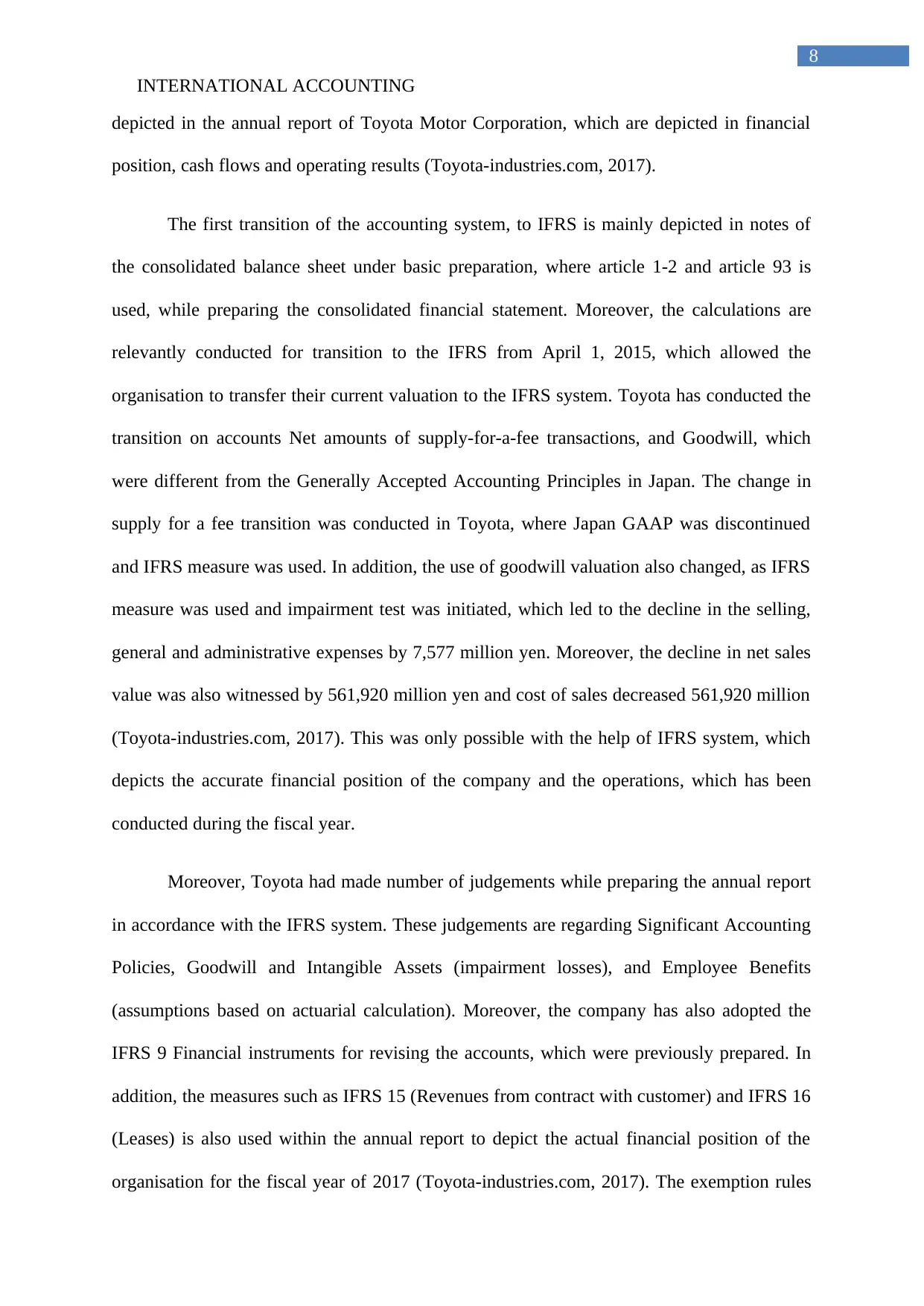
INTERNATIONAL ACCOUNTING
8
depicted in the annual report of Toyota Motor Corporation, which are depicted in financial
position, cash flows and operating results (Toyota-industries.com, 2017).
The first transition of the accounting system, to IFRS is mainly depicted in notes of
the consolidated balance sheet under basic preparation, where article 1-2 and article 93 is
used, while preparing the consolidated financial statement. Moreover, the calculations are
relevantly conducted for transition to the IFRS from April 1, 2015, which allowed the
organisation to transfer their current valuation to the IFRS system. Toyota has conducted the
transition on accounts Net amounts of supply-for-a-fee transactions, and Goodwill, which
were different from the Generally Accepted Accounting Principles in Japan. The change in
supply for a fee transition was conducted in Toyota, where Japan GAAP was discontinued
and IFRS measure was used. In addition, the use of goodwill valuation also changed, as IFRS
measure was used and impairment test was initiated, which led to the decline in the selling,
general and administrative expenses by 7,577 million yen. Moreover, the decline in net sales
value was also witnessed by 561,920 million yen and cost of sales decreased 561,920 million
(Toyota-industries.com, 2017). This was only possible with the help of IFRS system, which
depicts the accurate financial position of the company and the operations, which has been
conducted during the fiscal year.
Moreover, Toyota had made number of judgements while preparing the annual report
in accordance with the IFRS system. These judgements are regarding Significant Accounting
Policies, Goodwill and Intangible Assets (impairment losses), and Employee Benefits
(assumptions based on actuarial calculation). Moreover, the company has also adopted the
IFRS 9 Financial instruments for revising the accounts, which were previously prepared. In
addition, the measures such as IFRS 15 (Revenues from contract with customer) and IFRS 16
(Leases) is also used within the annual report to depict the actual financial position of the
organisation for the fiscal year of 2017 (Toyota-industries.com, 2017). The exemption rules
8
depicted in the annual report of Toyota Motor Corporation, which are depicted in financial
position, cash flows and operating results (Toyota-industries.com, 2017).
The first transition of the accounting system, to IFRS is mainly depicted in notes of
the consolidated balance sheet under basic preparation, where article 1-2 and article 93 is
used, while preparing the consolidated financial statement. Moreover, the calculations are
relevantly conducted for transition to the IFRS from April 1, 2015, which allowed the
organisation to transfer their current valuation to the IFRS system. Toyota has conducted the
transition on accounts Net amounts of supply-for-a-fee transactions, and Goodwill, which
were different from the Generally Accepted Accounting Principles in Japan. The change in
supply for a fee transition was conducted in Toyota, where Japan GAAP was discontinued
and IFRS measure was used. In addition, the use of goodwill valuation also changed, as IFRS
measure was used and impairment test was initiated, which led to the decline in the selling,
general and administrative expenses by 7,577 million yen. Moreover, the decline in net sales
value was also witnessed by 561,920 million yen and cost of sales decreased 561,920 million
(Toyota-industries.com, 2017). This was only possible with the help of IFRS system, which
depicts the accurate financial position of the company and the operations, which has been
conducted during the fiscal year.
Moreover, Toyota had made number of judgements while preparing the annual report
in accordance with the IFRS system. These judgements are regarding Significant Accounting
Policies, Goodwill and Intangible Assets (impairment losses), and Employee Benefits
(assumptions based on actuarial calculation). Moreover, the company has also adopted the
IFRS 9 Financial instruments for revising the accounts, which were previously prepared. In
addition, the measures such as IFRS 15 (Revenues from contract with customer) and IFRS 16
(Leases) is also used within the annual report to depict the actual financial position of the
organisation for the fiscal year of 2017 (Toyota-industries.com, 2017). The exemption rules
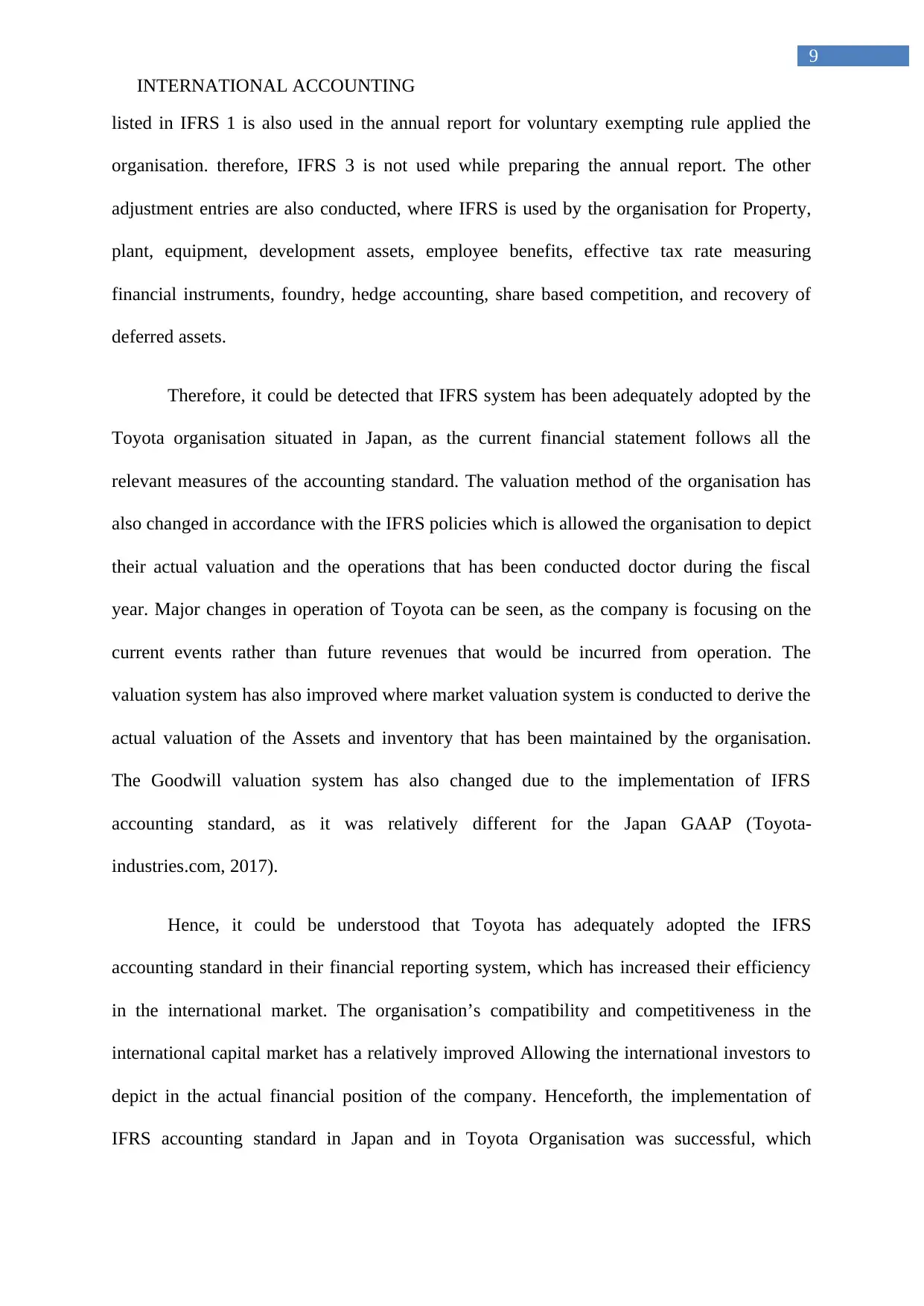
INTERNATIONAL ACCOUNTING
9
listed in IFRS 1 is also used in the annual report for voluntary exempting rule applied the
organisation. therefore, IFRS 3 is not used while preparing the annual report. The other
adjustment entries are also conducted, where IFRS is used by the organisation for Property,
plant, equipment, development assets, employee benefits, effective tax rate measuring
financial instruments, foundry, hedge accounting, share based competition, and recovery of
deferred assets.
Therefore, it could be detected that IFRS system has been adequately adopted by the
Toyota organisation situated in Japan, as the current financial statement follows all the
relevant measures of the accounting standard. The valuation method of the organisation has
also changed in accordance with the IFRS policies which is allowed the organisation to depict
their actual valuation and the operations that has been conducted doctor during the fiscal
year. Major changes in operation of Toyota can be seen, as the company is focusing on the
current events rather than future revenues that would be incurred from operation. The
valuation system has also improved where market valuation system is conducted to derive the
actual valuation of the Assets and inventory that has been maintained by the organisation.
The Goodwill valuation system has also changed due to the implementation of IFRS
accounting standard, as it was relatively different for the Japan GAAP (Toyota-
industries.com, 2017).
Hence, it could be understood that Toyota has adequately adopted the IFRS
accounting standard in their financial reporting system, which has increased their efficiency
in the international market. The organisation’s compatibility and competitiveness in the
international capital market has a relatively improved Allowing the international investors to
depict in the actual financial position of the company. Henceforth, the implementation of
IFRS accounting standard in Japan and in Toyota Organisation was successful, which
9
listed in IFRS 1 is also used in the annual report for voluntary exempting rule applied the
organisation. therefore, IFRS 3 is not used while preparing the annual report. The other
adjustment entries are also conducted, where IFRS is used by the organisation for Property,
plant, equipment, development assets, employee benefits, effective tax rate measuring
financial instruments, foundry, hedge accounting, share based competition, and recovery of
deferred assets.
Therefore, it could be detected that IFRS system has been adequately adopted by the
Toyota organisation situated in Japan, as the current financial statement follows all the
relevant measures of the accounting standard. The valuation method of the organisation has
also changed in accordance with the IFRS policies which is allowed the organisation to depict
their actual valuation and the operations that has been conducted doctor during the fiscal
year. Major changes in operation of Toyota can be seen, as the company is focusing on the
current events rather than future revenues that would be incurred from operation. The
valuation system has also improved where market valuation system is conducted to derive the
actual valuation of the Assets and inventory that has been maintained by the organisation.
The Goodwill valuation system has also changed due to the implementation of IFRS
accounting standard, as it was relatively different for the Japan GAAP (Toyota-
industries.com, 2017).
Hence, it could be understood that Toyota has adequately adopted the IFRS
accounting standard in their financial reporting system, which has increased their efficiency
in the international market. The organisation’s compatibility and competitiveness in the
international capital market has a relatively improved Allowing the international investors to
depict in the actual financial position of the company. Henceforth, the implementation of
IFRS accounting standard in Japan and in Toyota Organisation was successful, which
Secure Best Marks with AI Grader
Need help grading? Try our AI Grader for instant feedback on your assignments.
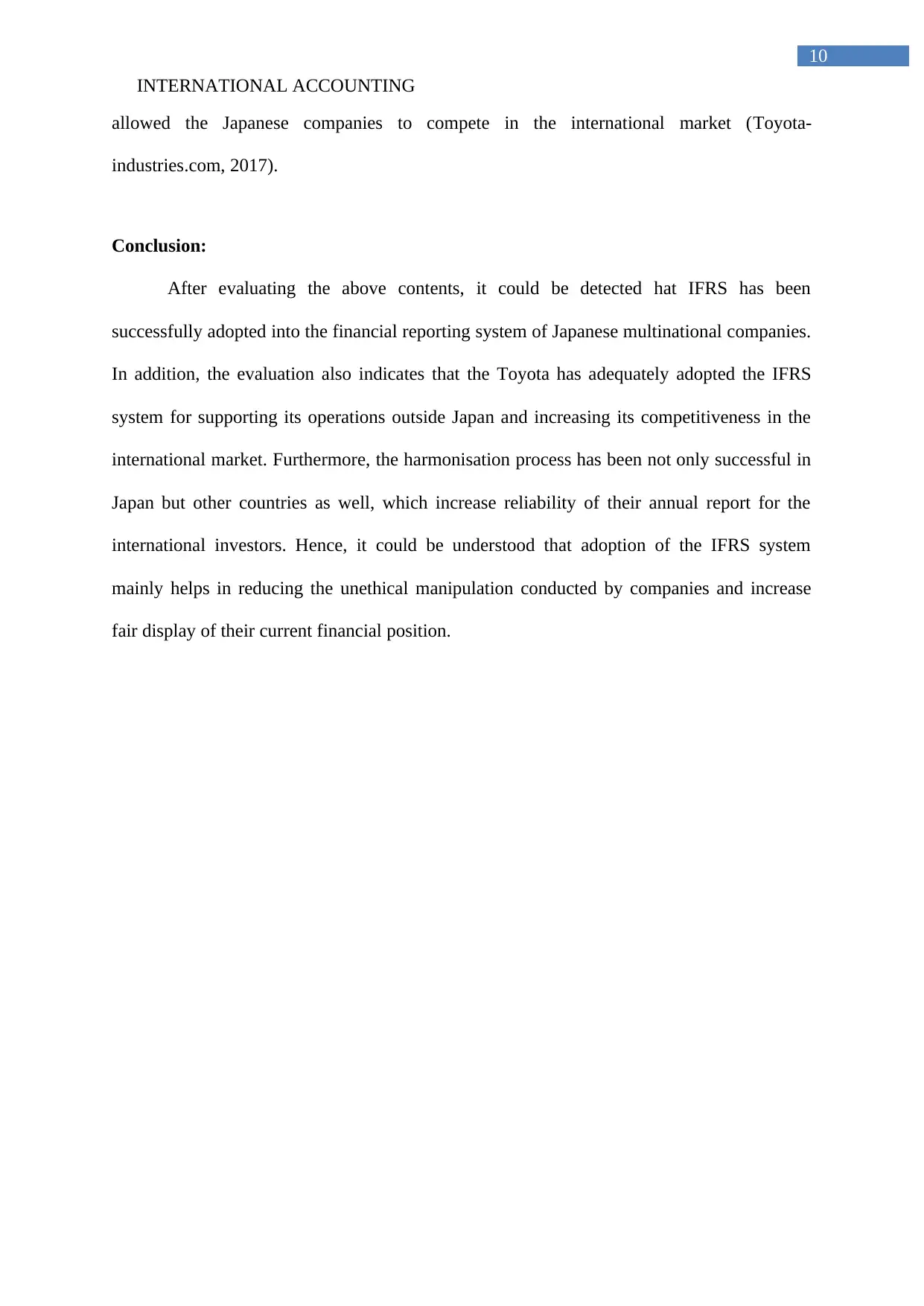
INTERNATIONAL ACCOUNTING
10
allowed the Japanese companies to compete in the international market (Toyota-
industries.com, 2017).
Conclusion:
After evaluating the above contents, it could be detected hat IFRS has been
successfully adopted into the financial reporting system of Japanese multinational companies.
In addition, the evaluation also indicates that the Toyota has adequately adopted the IFRS
system for supporting its operations outside Japan and increasing its competitiveness in the
international market. Furthermore, the harmonisation process has been not only successful in
Japan but other countries as well, which increase reliability of their annual report for the
international investors. Hence, it could be understood that adoption of the IFRS system
mainly helps in reducing the unethical manipulation conducted by companies and increase
fair display of their current financial position.
10
allowed the Japanese companies to compete in the international market (Toyota-
industries.com, 2017).
Conclusion:
After evaluating the above contents, it could be detected hat IFRS has been
successfully adopted into the financial reporting system of Japanese multinational companies.
In addition, the evaluation also indicates that the Toyota has adequately adopted the IFRS
system for supporting its operations outside Japan and increasing its competitiveness in the
international market. Furthermore, the harmonisation process has been not only successful in
Japan but other countries as well, which increase reliability of their annual report for the
international investors. Hence, it could be understood that adoption of the IFRS system
mainly helps in reducing the unethical manipulation conducted by companies and increase
fair display of their current financial position.
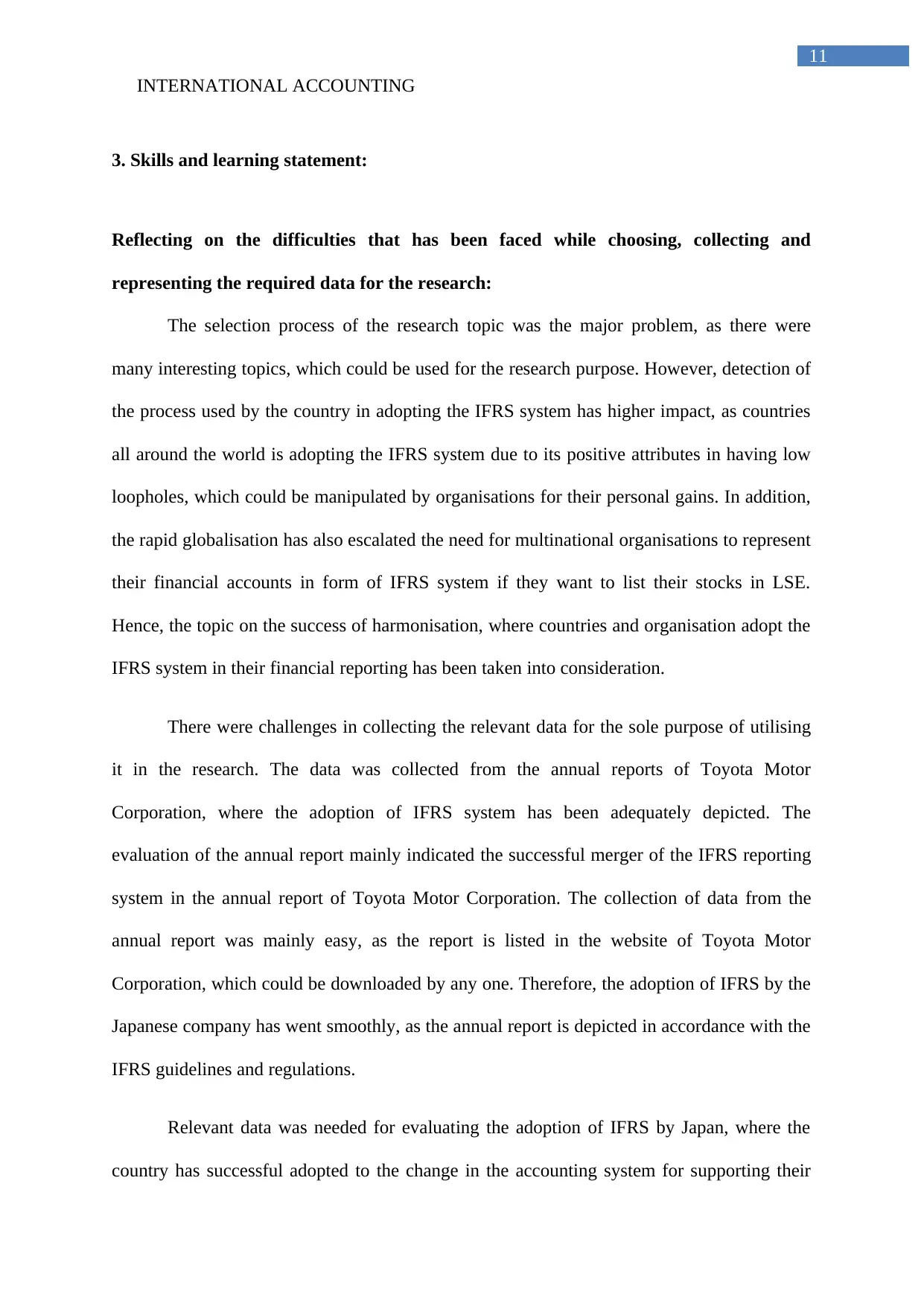
INTERNATIONAL ACCOUNTING
11
3. Skills and learning statement:
Reflecting on the difficulties that has been faced while choosing, collecting and
representing the required data for the research:
The selection process of the research topic was the major problem, as there were
many interesting topics, which could be used for the research purpose. However, detection of
the process used by the country in adopting the IFRS system has higher impact, as countries
all around the world is adopting the IFRS system due to its positive attributes in having low
loopholes, which could be manipulated by organisations for their personal gains. In addition,
the rapid globalisation has also escalated the need for multinational organisations to represent
their financial accounts in form of IFRS system if they want to list their stocks in LSE.
Hence, the topic on the success of harmonisation, where countries and organisation adopt the
IFRS system in their financial reporting has been taken into consideration.
There were challenges in collecting the relevant data for the sole purpose of utilising
it in the research. The data was collected from the annual reports of Toyota Motor
Corporation, where the adoption of IFRS system has been adequately depicted. The
evaluation of the annual report mainly indicated the successful merger of the IFRS reporting
system in the annual report of Toyota Motor Corporation. The collection of data from the
annual report was mainly easy, as the report is listed in the website of Toyota Motor
Corporation, which could be downloaded by any one. Therefore, the adoption of IFRS by the
Japanese company has went smoothly, as the annual report is depicted in accordance with the
IFRS guidelines and regulations.
Relevant data was needed for evaluating the adoption of IFRS by Japan, where the
country has successful adopted to the change in the accounting system for supporting their
11
3. Skills and learning statement:
Reflecting on the difficulties that has been faced while choosing, collecting and
representing the required data for the research:
The selection process of the research topic was the major problem, as there were
many interesting topics, which could be used for the research purpose. However, detection of
the process used by the country in adopting the IFRS system has higher impact, as countries
all around the world is adopting the IFRS system due to its positive attributes in having low
loopholes, which could be manipulated by organisations for their personal gains. In addition,
the rapid globalisation has also escalated the need for multinational organisations to represent
their financial accounts in form of IFRS system if they want to list their stocks in LSE.
Hence, the topic on the success of harmonisation, where countries and organisation adopt the
IFRS system in their financial reporting has been taken into consideration.
There were challenges in collecting the relevant data for the sole purpose of utilising
it in the research. The data was collected from the annual reports of Toyota Motor
Corporation, where the adoption of IFRS system has been adequately depicted. The
evaluation of the annual report mainly indicated the successful merger of the IFRS reporting
system in the annual report of Toyota Motor Corporation. The collection of data from the
annual report was mainly easy, as the report is listed in the website of Toyota Motor
Corporation, which could be downloaded by any one. Therefore, the adoption of IFRS by the
Japanese company has went smoothly, as the annual report is depicted in accordance with the
IFRS guidelines and regulations.
Relevant data was needed for evaluating the adoption of IFRS by Japan, where the
country has successful adopted to the change in the accounting system for supporting their
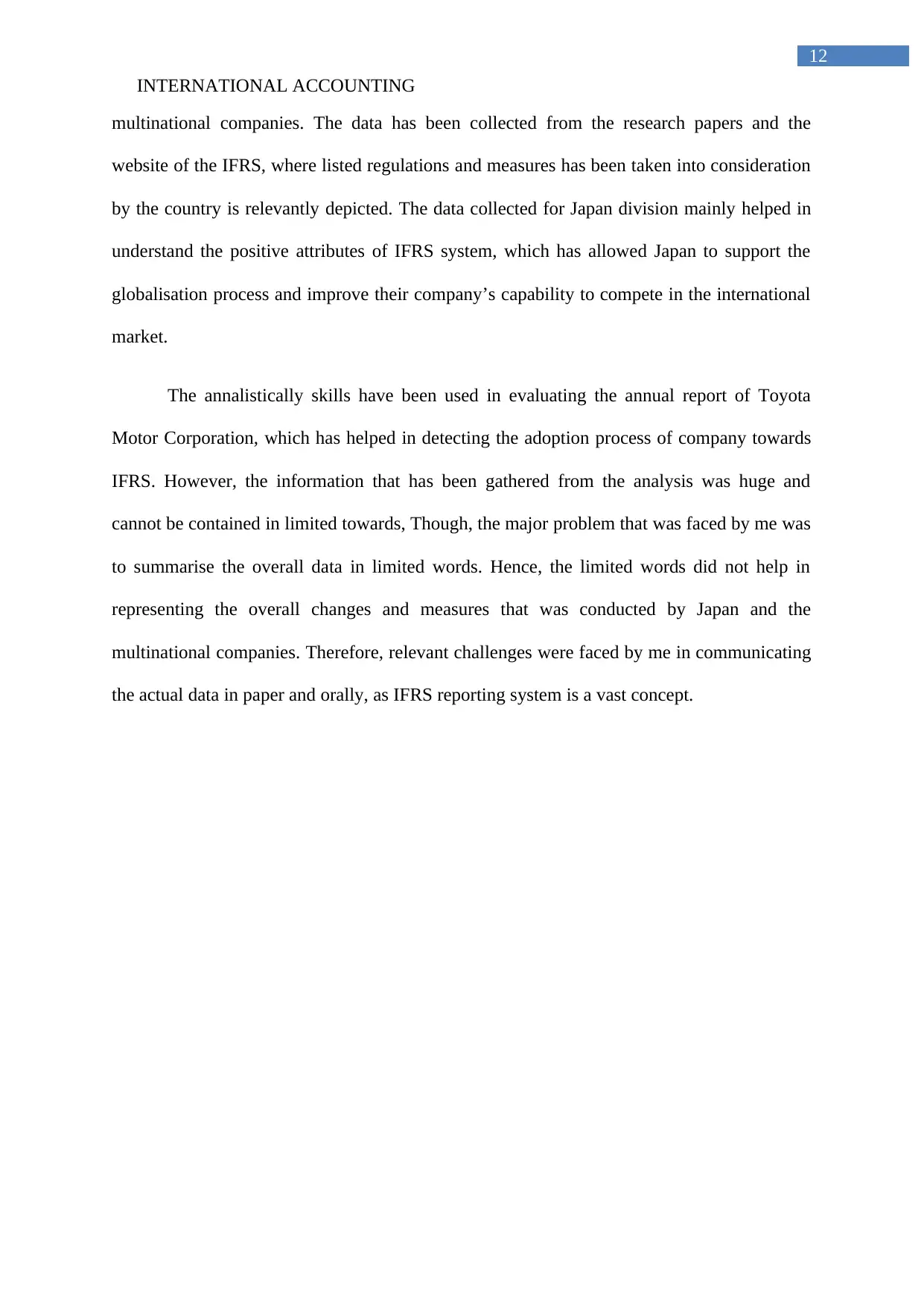
INTERNATIONAL ACCOUNTING
12
multinational companies. The data has been collected from the research papers and the
website of the IFRS, where listed regulations and measures has been taken into consideration
by the country is relevantly depicted. The data collected for Japan division mainly helped in
understand the positive attributes of IFRS system, which has allowed Japan to support the
globalisation process and improve their company’s capability to compete in the international
market.
The annalistically skills have been used in evaluating the annual report of Toyota
Motor Corporation, which has helped in detecting the adoption process of company towards
IFRS. However, the information that has been gathered from the analysis was huge and
cannot be contained in limited towards, Though, the major problem that was faced by me was
to summarise the overall data in limited words. Hence, the limited words did not help in
representing the overall changes and measures that was conducted by Japan and the
multinational companies. Therefore, relevant challenges were faced by me in communicating
the actual data in paper and orally, as IFRS reporting system is a vast concept.
12
multinational companies. The data has been collected from the research papers and the
website of the IFRS, where listed regulations and measures has been taken into consideration
by the country is relevantly depicted. The data collected for Japan division mainly helped in
understand the positive attributes of IFRS system, which has allowed Japan to support the
globalisation process and improve their company’s capability to compete in the international
market.
The annalistically skills have been used in evaluating the annual report of Toyota
Motor Corporation, which has helped in detecting the adoption process of company towards
IFRS. However, the information that has been gathered from the analysis was huge and
cannot be contained in limited towards, Though, the major problem that was faced by me was
to summarise the overall data in limited words. Hence, the limited words did not help in
representing the overall changes and measures that was conducted by Japan and the
multinational companies. Therefore, relevant challenges were faced by me in communicating
the actual data in paper and orally, as IFRS reporting system is a vast concept.
Paraphrase This Document
Need a fresh take? Get an instant paraphrase of this document with our AI Paraphraser
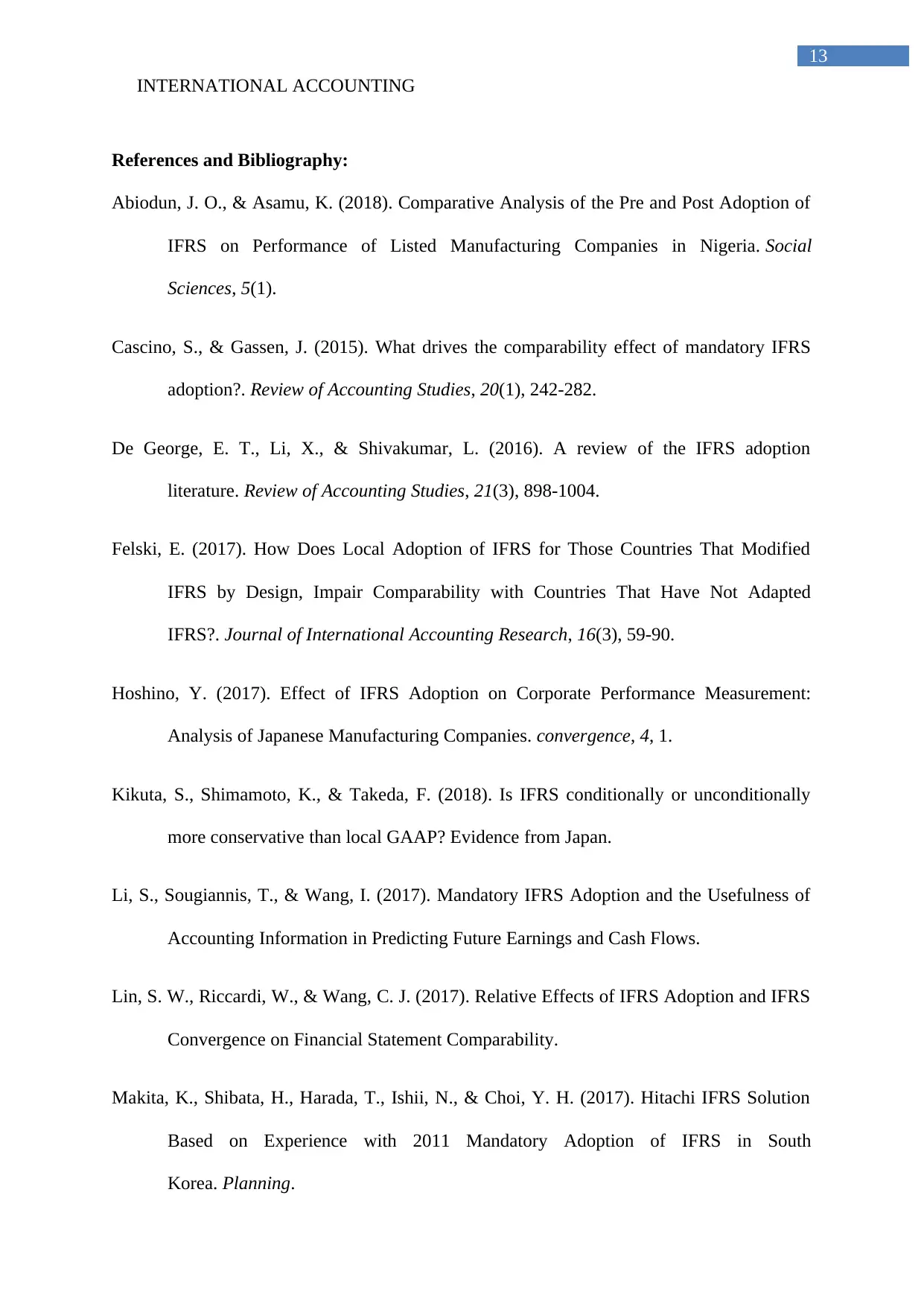
INTERNATIONAL ACCOUNTING
13
References and Bibliography:
Abiodun, J. O., & Asamu, K. (2018). Comparative Analysis of the Pre and Post Adoption of
IFRS on Performance of Listed Manufacturing Companies in Nigeria. Social
Sciences, 5(1).
Cascino, S., & Gassen, J. (2015). What drives the comparability effect of mandatory IFRS
adoption?. Review of Accounting Studies, 20(1), 242-282.
De George, E. T., Li, X., & Shivakumar, L. (2016). A review of the IFRS adoption
literature. Review of Accounting Studies, 21(3), 898-1004.
Felski, E. (2017). How Does Local Adoption of IFRS for Those Countries That Modified
IFRS by Design, Impair Comparability with Countries That Have Not Adapted
IFRS?. Journal of International Accounting Research, 16(3), 59-90.
Hoshino, Y. (2017). Effect of IFRS Adoption on Corporate Performance Measurement:
Analysis of Japanese Manufacturing Companies. convergence, 4, 1.
Kikuta, S., Shimamoto, K., & Takeda, F. (2018). Is IFRS conditionally or unconditionally
more conservative than local GAAP? Evidence from Japan.
Li, S., Sougiannis, T., & Wang, I. (2017). Mandatory IFRS Adoption and the Usefulness of
Accounting Information in Predicting Future Earnings and Cash Flows.
Lin, S. W., Riccardi, W., & Wang, C. J. (2017). Relative Effects of IFRS Adoption and IFRS
Convergence on Financial Statement Comparability.
Makita, K., Shibata, H., Harada, T., Ishii, N., & Choi, Y. H. (2017). Hitachi IFRS Solution
Based on Experience with 2011 Mandatory Adoption of IFRS in South
Korea. Planning.
13
References and Bibliography:
Abiodun, J. O., & Asamu, K. (2018). Comparative Analysis of the Pre and Post Adoption of
IFRS on Performance of Listed Manufacturing Companies in Nigeria. Social
Sciences, 5(1).
Cascino, S., & Gassen, J. (2015). What drives the comparability effect of mandatory IFRS
adoption?. Review of Accounting Studies, 20(1), 242-282.
De George, E. T., Li, X., & Shivakumar, L. (2016). A review of the IFRS adoption
literature. Review of Accounting Studies, 21(3), 898-1004.
Felski, E. (2017). How Does Local Adoption of IFRS for Those Countries That Modified
IFRS by Design, Impair Comparability with Countries That Have Not Adapted
IFRS?. Journal of International Accounting Research, 16(3), 59-90.
Hoshino, Y. (2017). Effect of IFRS Adoption on Corporate Performance Measurement:
Analysis of Japanese Manufacturing Companies. convergence, 4, 1.
Kikuta, S., Shimamoto, K., & Takeda, F. (2018). Is IFRS conditionally or unconditionally
more conservative than local GAAP? Evidence from Japan.
Li, S., Sougiannis, T., & Wang, I. (2017). Mandatory IFRS Adoption and the Usefulness of
Accounting Information in Predicting Future Earnings and Cash Flows.
Lin, S. W., Riccardi, W., & Wang, C. J. (2017). Relative Effects of IFRS Adoption and IFRS
Convergence on Financial Statement Comparability.
Makita, K., Shibata, H., Harada, T., Ishii, N., & Choi, Y. H. (2017). Hitachi IFRS Solution
Based on Experience with 2011 Mandatory Adoption of IFRS in South
Korea. Planning.
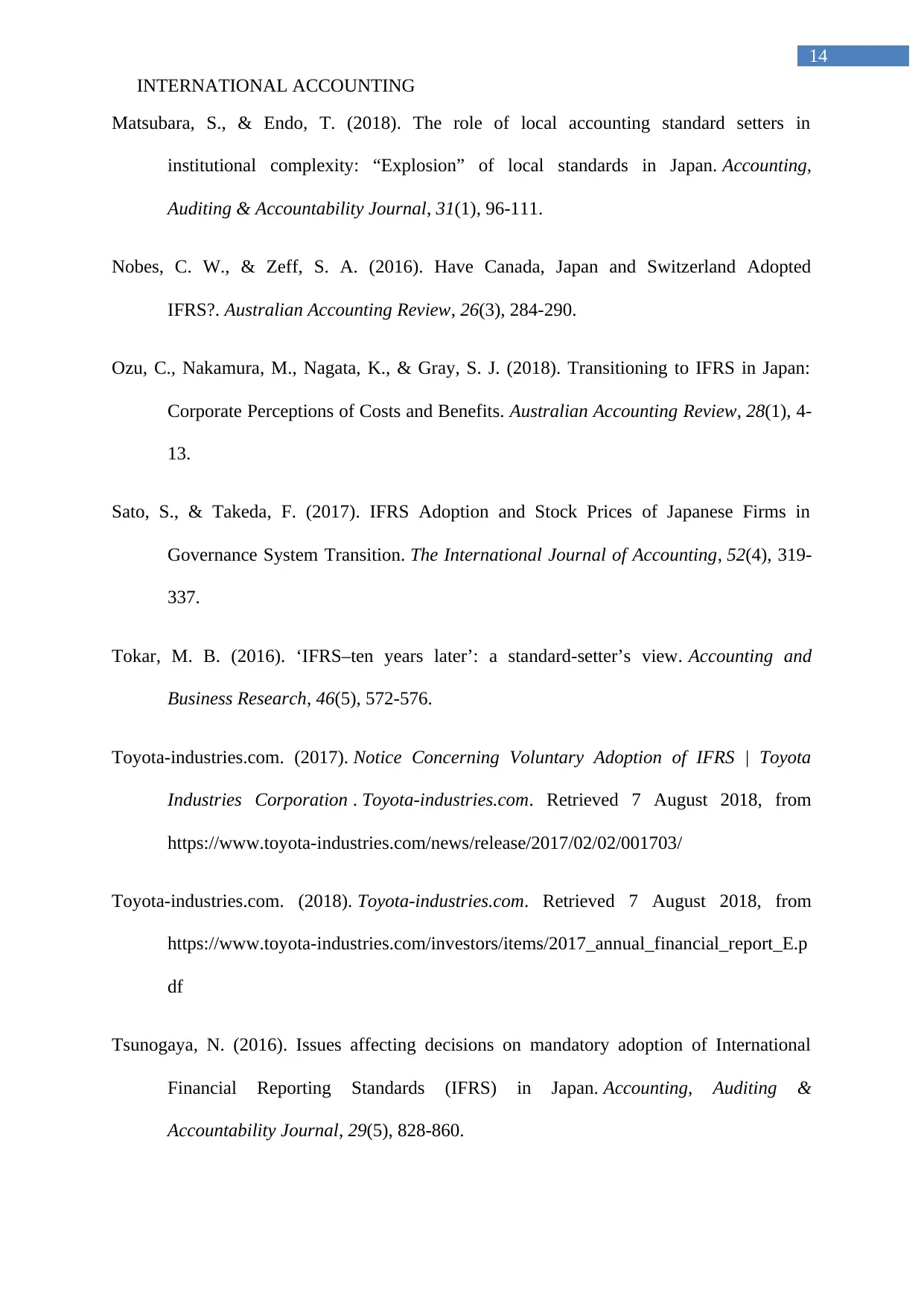
INTERNATIONAL ACCOUNTING
14
Matsubara, S., & Endo, T. (2018). The role of local accounting standard setters in
institutional complexity: “Explosion” of local standards in Japan. Accounting,
Auditing & Accountability Journal, 31(1), 96-111.
Nobes, C. W., & Zeff, S. A. (2016). Have Canada, Japan and Switzerland Adopted
IFRS?. Australian Accounting Review, 26(3), 284-290.
Ozu, C., Nakamura, M., Nagata, K., & Gray, S. J. (2018). Transitioning to IFRS in Japan:
Corporate Perceptions of Costs and Benefits. Australian Accounting Review, 28(1), 4-
13.
Sato, S., & Takeda, F. (2017). IFRS Adoption and Stock Prices of Japanese Firms in
Governance System Transition. The International Journal of Accounting, 52(4), 319-
337.
Tokar, M. B. (2016). ‘IFRS–ten years later’: a standard-setter’s view. Accounting and
Business Research, 46(5), 572-576.
Toyota-industries.com. (2017). Notice Concerning Voluntary Adoption of IFRS | Toyota
Industries Corporation . Toyota-industries.com. Retrieved 7 August 2018, from
https://www.toyota-industries.com/news/release/2017/02/02/001703/
Toyota-industries.com. (2018). Toyota-industries.com. Retrieved 7 August 2018, from
https://www.toyota-industries.com/investors/items/2017_annual_financial_report_E.p
df
Tsunogaya, N. (2016). Issues affecting decisions on mandatory adoption of International
Financial Reporting Standards (IFRS) in Japan. Accounting, Auditing &
Accountability Journal, 29(5), 828-860.
14
Matsubara, S., & Endo, T. (2018). The role of local accounting standard setters in
institutional complexity: “Explosion” of local standards in Japan. Accounting,
Auditing & Accountability Journal, 31(1), 96-111.
Nobes, C. W., & Zeff, S. A. (2016). Have Canada, Japan and Switzerland Adopted
IFRS?. Australian Accounting Review, 26(3), 284-290.
Ozu, C., Nakamura, M., Nagata, K., & Gray, S. J. (2018). Transitioning to IFRS in Japan:
Corporate Perceptions of Costs and Benefits. Australian Accounting Review, 28(1), 4-
13.
Sato, S., & Takeda, F. (2017). IFRS Adoption and Stock Prices of Japanese Firms in
Governance System Transition. The International Journal of Accounting, 52(4), 319-
337.
Tokar, M. B. (2016). ‘IFRS–ten years later’: a standard-setter’s view. Accounting and
Business Research, 46(5), 572-576.
Toyota-industries.com. (2017). Notice Concerning Voluntary Adoption of IFRS | Toyota
Industries Corporation . Toyota-industries.com. Retrieved 7 August 2018, from
https://www.toyota-industries.com/news/release/2017/02/02/001703/
Toyota-industries.com. (2018). Toyota-industries.com. Retrieved 7 August 2018, from
https://www.toyota-industries.com/investors/items/2017_annual_financial_report_E.p
df
Tsunogaya, N. (2016). Issues affecting decisions on mandatory adoption of International
Financial Reporting Standards (IFRS) in Japan. Accounting, Auditing &
Accountability Journal, 29(5), 828-860.
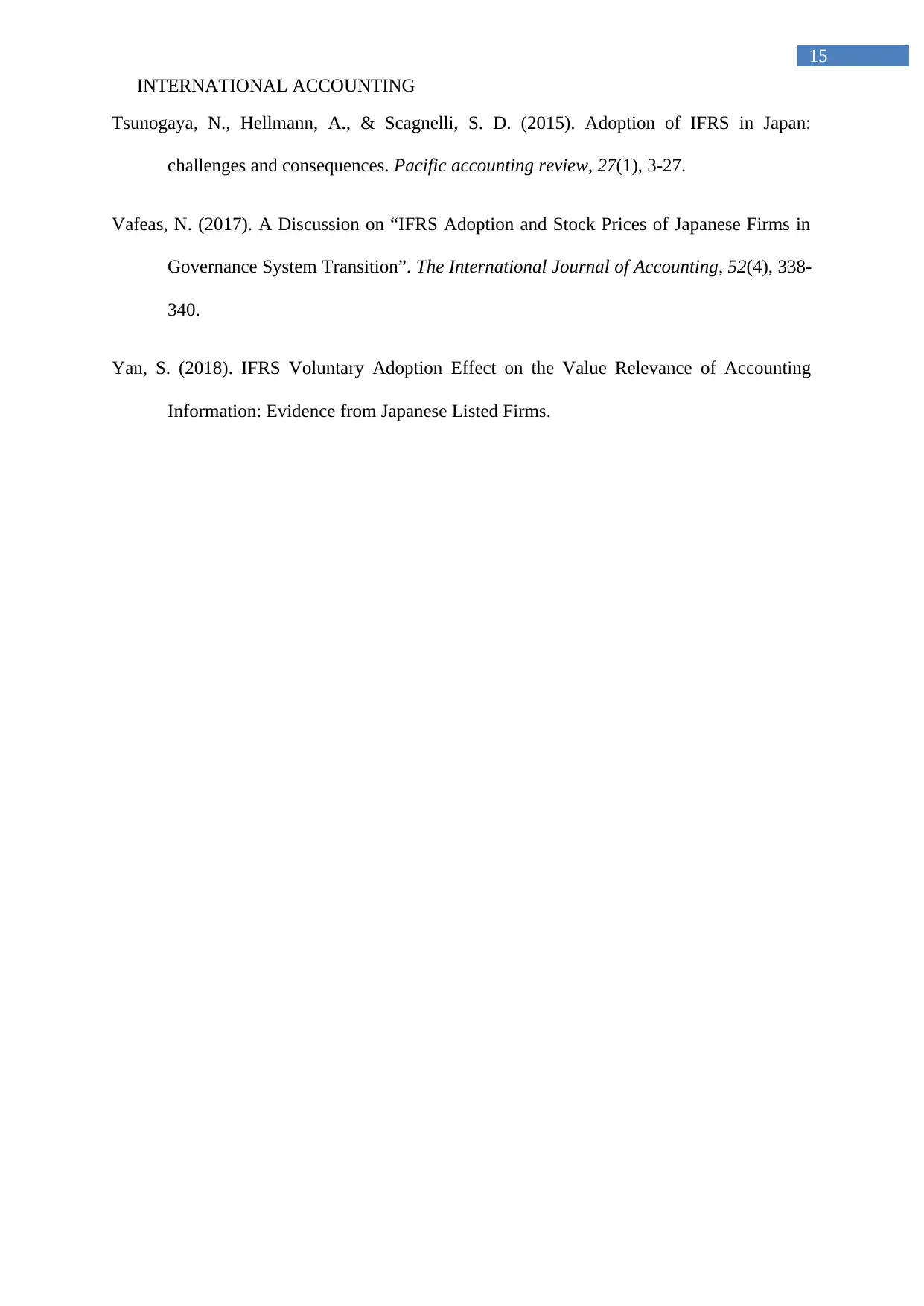
INTERNATIONAL ACCOUNTING
15
Tsunogaya, N., Hellmann, A., & Scagnelli, S. D. (2015). Adoption of IFRS in Japan:
challenges and consequences. Pacific accounting review, 27(1), 3-27.
Vafeas, N. (2017). A Discussion on “IFRS Adoption and Stock Prices of Japanese Firms in
Governance System Transition”. The International Journal of Accounting, 52(4), 338-
340.
Yan, S. (2018). IFRS Voluntary Adoption Effect on the Value Relevance of Accounting
Information: Evidence from Japanese Listed Firms.
15
Tsunogaya, N., Hellmann, A., & Scagnelli, S. D. (2015). Adoption of IFRS in Japan:
challenges and consequences. Pacific accounting review, 27(1), 3-27.
Vafeas, N. (2017). A Discussion on “IFRS Adoption and Stock Prices of Japanese Firms in
Governance System Transition”. The International Journal of Accounting, 52(4), 338-
340.
Yan, S. (2018). IFRS Voluntary Adoption Effect on the Value Relevance of Accounting
Information: Evidence from Japanese Listed Firms.
1 out of 16
Related Documents
Your All-in-One AI-Powered Toolkit for Academic Success.
+13062052269
info@desklib.com
Available 24*7 on WhatsApp / Email
![[object Object]](/_next/static/media/star-bottom.7253800d.svg)
Unlock your academic potential
© 2024 | Zucol Services PVT LTD | All rights reserved.




